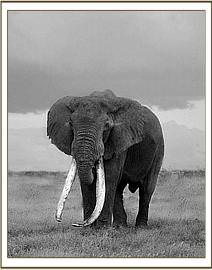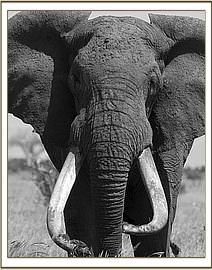Kenya seeks US support against ivory trade Daily Nation February 9, 2010
Kenya’s campaign against trade in elephant ivory goes before the US Congress Wednesday as the government solicits support for its proposal for a 20-year moratorium.A senior scientist from the Kenya Wildlife Service left for Washington DC Monday to testify about wildlife issues before a US House of Representative committee on Natural Resources. Patrick Omondi, KWS Head of Species Conservation and Management will brief the committee on the state of elephant poaching with a view to enlisting the US support in opposing Tanzania and Zambia’s proposals to carry out a one-off sale of almost 110 tonnes of ivory.
The House Subcommittee on Insular Affairs, Oceans and Wildlife will on Thursday hold the oversight hearing on the Convention on International Trade in Endangered Species (CITES) as part of the American government’s preparations for next month’s CITES meeting,” a statement from KWS said. It added, “The hearing will focus on a wide range of proposals that will be considered at the March 13-25 CITES meeting in Doha, Qatar, including many proposals to amend Appendices I and II.”

Kenya and Mali, who have opposed Tanzania’s stance, the statement added, were continuing with consultations with other foreign missions represented in Nairobi as well. Efforts to protect the African elephant have already secured the backing of 16 countries in the continent who are members of the African Elephant Coalition (AEC) at a meeting in Brussels last month. The countries include Mali, Benin, Central African Republic, Chad, Ethiopia, Ghana, Guinea, Guinea Bissau, Mauritania, Niger, Nigeria, Rwanda, Senegal, Togo, Republic of Congo and Government of Southern Sudan.
Tanzania and Zambia on the other hand are banking on the support of range countries from the Southern African Development Community (SADC) to have clearance to offload its stockpile. But the European Union, with a, membership of 27 in the 175-member CITES is expected to tip the scales in the battle that pits neighbours Kenya and Tanzania. At the Brussels meeting, Forestry and Wildlife Affairs minister Dr Noah Wekesa led the AEC in a meeting with representatives of the EU to seek their support for their proposal on elephants.


Kenya wants the current nine-year ivory trade moratorium, negotiated in 2007 in The Hague be increased to 20 years as well as a plea to CITES members to reject the proposals from Tanzania and Zambia. The agreement was negotiated by Germany that held the CITES presidency at the time. The rotating presidency is now with Spain, also a member of the EU.
Kenya argues that since the CITES-approved one-off sales in 2008 by Botswana, Namibia, South Africa and Zimbabwe the level of poaching has gone up drastically. In 2009, 232 elephants were killed by poachers up from 145 in 2008 and 47 in 2007 within Kenya. Tanzania and Zambia have exploited a loophole in drafting the text of the agreement that only barred Botswana, Namibia, South Africa and Zimbabwe from submitting proposals until 2017.
Before he left, Mr Omondi told the Nation that Germany which was instrumental in hammering the nine-year deal in 2007 has written to all EU member states to clarify the exact position as agreed at the meeting. “The letter is very clear that the nine-year moratorium was placed on all range states,” Mr Omondi said.
EU member states will have to consider this letter by Germany before coming up with a decision to support or block another one-off sale of ivory, he explained.
Article at the following link:
http://www.nation.co.ke/News/-/1056/858492/-/vq1thu/-/
Please sign this petition to help stop the trade. http://www.thepetitionsite.com/1/no-more-trade-in-elephant-ivory


